The Last Jew Is Never Alone
| April 16, 2024Globetrotter Moshe Klein finds a minyan of one in Eritrea
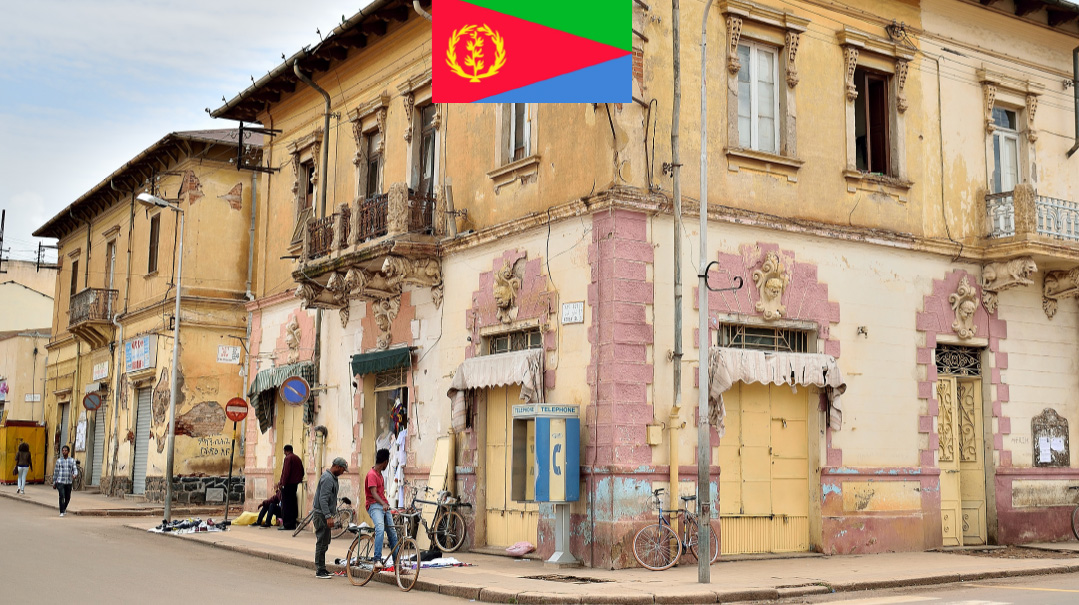
Photos: Moshe Klein
Globetrotter Moshe Klein didn’t have great expectations in planning a trip to Eritrea, a small country with little Jewish history located across the Red Sea from Yemen. But a providential meeting with the one remaining Jew showed him a country he’ll never forget
World traveler Moshe Klein didn’t expect any high drama on his visit to Eritrea, a relatively small country with little Jewish history that is located across the Red Sea from Yemen. But funny things happen when you travel. Losing his luggage turned out to be the best thing that could have happened to Klein, leading him to the home of Eritrea’s only Jewish resident, and a glimpse of the country he will never forget.
Within Limits
Situated on the Horn of Africa, north of Ethiopia and east of Sudan, Eritrea is not such an easy country to get into. Two years after Eritrea won its 30-year-long war for independence from Ethiopia, Isaias Afwerki became the country’s president, as well as the chairman of its only legal political party, the People’s Front for Democracy and Justice. Eritrea has no legislature, no functioning constitution, and no published budget, and Afwerki controls both the judiciary and the military. Human Rights Watch, which investigates abuse all over the world, asserts that Eritrea is a dictatorship; the US State Department goes so far as to describe the country as a “highly centralized totalitarian regime.”
In other words, getting into Eritrea isn’t as simple as booking a plane ticket and packing a bag. Few tourists are allowed in, but Klein had enjoyed visiting other countries in the region, and Eritrea earned a spot on his bucket list. He made sure to time his visit for Eritrea’s Independence Day celebration in late May, when travel visas are issued more liberally, and he was able to work the connections he’s acquired in his travels to get the necessary paperwork approved.
Klein’s visa allowed him to travel only with a guide within the city limits of Asmara, Eritrea’s capital and there were just a handful of other tourists on Klein’s flight to Asmara International Airport. While he could have applied for special permission to visit other sites during his four-day stay, all government offices were closed for Independence Day, so he made the most of his time in Asmara and nearby villages.
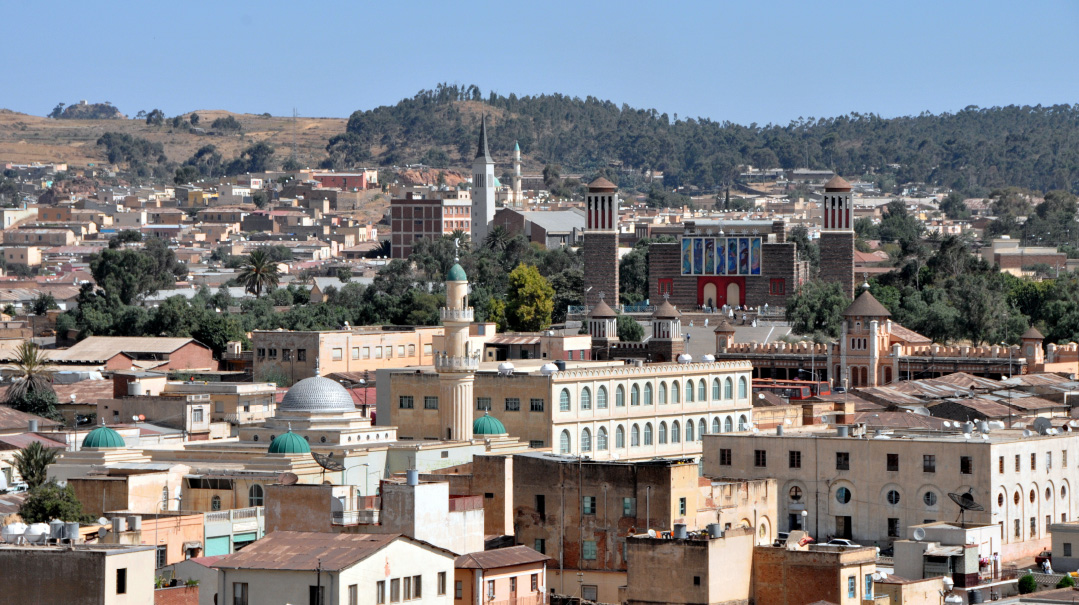
Lost Luggage
As a seasoned traveler, Klein knows the tricks of the trade. To avoid the problems of lost luggage, he typically flies with nothing more than a carry-on. But his flight to Eritrea from Dubai included a stopover in Addis Ababa, Ethiopia, where Klein was treated to an airport experience unlike anything he had ever encountered.
“A lot of people from Eritrea work in other countries, and when they come back home, they bring tons of luggage, like I’ve never seen before,” says Klein. “Literally every person on my flight had 10 or 20 bags, and they were all extra-large and extremely stuffed.”
The reason that returning Eritreans bring home massive amounts of luggage isn’t hard to understand. Because of war crimes reportedly committed by its armed forces, Eritrea is subject to severe long-term sanctions, making it nearly impossible to import anything into the country. If a particular item isn’t available locally, Eritreans typically have to travel abroad and bring it in by themselves, which translates into tremendous amounts of luggage on every flight into the country.
Ethiopian Airlines personnel informed Klein that he would have to check his carry-on for his flight, something he was extremely reluctant to do. With no alternative, Klein said a quick kapitel of Tehillim and hoped for the best, knowing he could at least track his bag’s location with the AirTag he had packed on the off chance it went missing.
And, of course, it did.
When Klein and his wife, Esther, landed in Asmara some 90 minutes later, they waited in vain at the baggage carousel for their carry-ons to arrive. Worse than arriving in Eritrea with little more than the clothes on their back, Klein’s tefillin had been in his carry-on bag. According to his AirTag, the Kleins’ luggage was still in Addis Ababa. Airline personnel assured him the bags would be arriving on the next flight.
Klein had already put on tefillin that morning. But when their bags failed to show up on the next Ethiopian Airlines flight from Addis Ababa, he wondered if he would have his tefillin for Shacharis the next day.
“At some point, I started to think that it would never arrive, because every day there are more people and more luggage,” says Klein. “By 12 o’clock the next day, it still hadn’t come, and I still hadn’t davened. They promised me by all things holy that they would get it to me by the afternoon, which meant I still could be yotzei on tefillin for the day. But I just didn’t believe them. They kept saying, ‘You will have, you will have….’ ”
Klein realized he had to resort to Plan B — find another Jew somewhere in Eritrea, and hope he had tefillin he was willing to share. A staff member at Klein’s hotel recommended he try his luck at the Israeli embassy, but any hope that might have sparked was quickly dashed when he learned that the Israeli embassy had permanently closed in the summer of 2022.
While researching Eritrea, Klein had heard that there had been one Jew living in the country at one time, but few people had managed to find him in recent years, and it was unclear if he was still there. Given that ambiguity, Klein had discounted the possibility of looking for him, but as his tefillin search continued, locals led him to the home of a man in his mid-seventies named Samuel Cohen. Klein approached Cohen’s home and knocked on the door. Seconds later it was opened by a tall, older man who, much to Klein’s relief, was wearing a yarmulke on his head.
“I said, ‘Shalom aleichem, can I borrow your tefillin?’ ” recalls Klein. “He told me that no one had ever asked him that question. It was a little uncomfortable for a moment, but then he accompanied me to the shul, and waited patiently while I put on his tefillin and davened.”
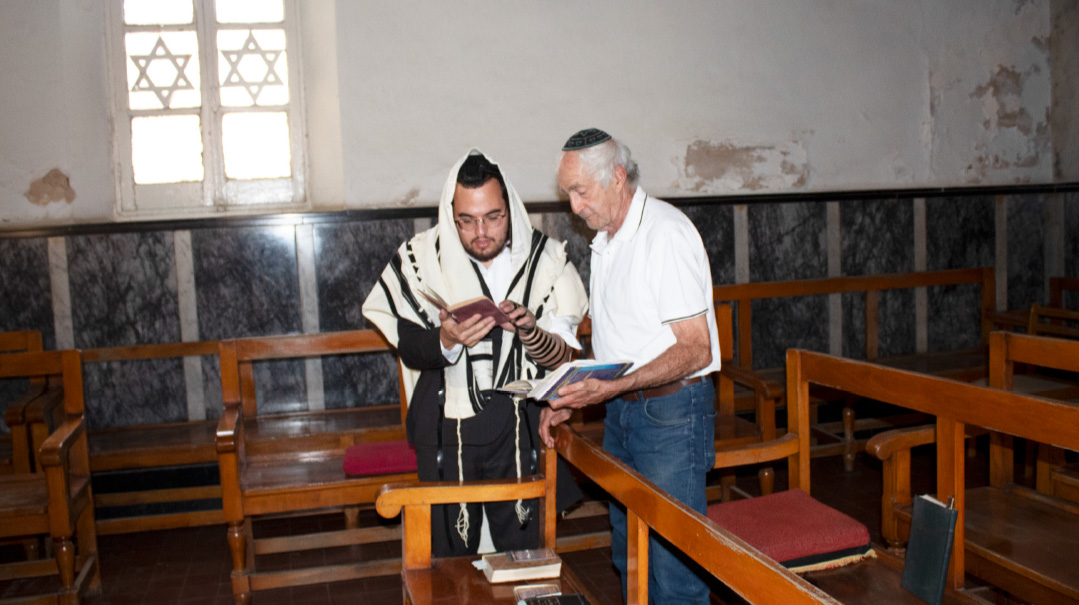
When the country’s one remaining Jew opened the door, Moshe was heartened: Surely he would share his tefillin
From Present to Past
As upsetting as it was to have been temporarily separated from his tefillin, it was immediately clear to Klein that the delayed arrival of his luggage had been a gift from Above. He had traveled to Eritrea to learn whatever he could about the country’s relatively short-lived Jewish community, and meeting the last remaining member of that community was an unexpected surprise and the highlight of his trip.
As Eritrea’s last Jew, Cohen is the caretaker of the compound that houses Asmara’s 119-year-old shul, a mikveh, the local Jewish cemetery, and classrooms that once teemed with children. Nearby residents hold Cohen and the compound in high esteem, viewing them as cherished components of the local community.
Cohen’s roots in the region run deep. His family hailed originally from Portugal, but migrated to Aden, now part of Yemen but previously a British colony. Like other Adenite Jewish families, they moved across the Red Sea to Africa’s Horn in the 1900s hoping to capitalize on its strategic location to further their trading business. When Jews began fleeing Europe in the 1930s with the Nazi rise to power, the Cohens watched the Asmara community grow larger.
Cohen’s formative years coincided with Jewish Eritrea’s heyday in the 1950s and ’60s, and even as the country came under Italian, British, and then Ethiopian rule, the community flourished. In 1975, the Jewish community’s idyllic existence ended when Eritrea sought independence from Ethiopia, resulting in a bloody civil war that lasted for many years. Most of Asmara’s Jews, including the city’s rabbi, fled Eritrea.
Having lived through much of Eritrea’s Jewish history, Cohen shared memories of what the community had been like as he gave Klein a tour of the compound, whose many rooms were filled with siddurim, Chumashim, and other seforim, some of which dated back to the 1800s.
Klein was fascinated by a 2018 letter that Queen Elizabeth II had sent to Cohen through Britian’s ambassador to Eritrea, thanking him for sending her a photograph of her 1955 visit to Asmara. There were also leftover labels that were used in a meat factory housed in one room in the shul in the 1950s, when some three dozen Gerrer chassidim came from Israel for three to four months at a time to shecht meat for the Israeli Rabbanut for export to Israel. The ezras nashim was piled high with items left behind for safekeeping when Asmara’s Jews left to settle in other places.
“One Yid who left put everything from his factories — papers, boxes, even toys — in a room in a shul,” observes Klein. “The Yid is probably dead by now, but what do you do with all of those things? Sami told me that he didn’t know what to do with it. But it wasn’t his to get rid of, so it’s all still there.”
From a distance, the shul itself appears graceful and statuesque, its Italian architecture accented with curved niches and a slate blue door topped with an arch. But once Klein was inside, it seemed to him that the shul was showing its age, and even though some renovations had been made for its centennial anniversary nearly two decades ago, additional repairs are now badly needed.
The multiple chandeliers that still dangle from the ceiling once illuminated the shul for the mispallelim who filled the brown wooden benches, today empty and bare. A white paroches offset by metallic gold trim fronts the tall double doors and black wooden millwork of the aron kodesh, which holds three sifrei Torah and a shofar that the Cohen family brought to Asmara from Aden more than a century ago.
Cohen visits the shul daily, saying Tehillim there, and then going into the office in his unofficial capacity as president of a Jewish community whose population is holding steady at one. While Cohen has done an admirable job of maintaining the property, the shul felt almost like a ghost town to Klein, with everything ready for the next tefillah except the nine other men needed to complete an actual minyan.
Klein made sure to visit the compound’s cemetery, where he saw the final resting places of Adenite and Yemenite Jews who had lived out their final days in Eritrea, as well as Jewish soldiers from the pioneer corps that fought the British in 1941. He was surprised to see an ohel in the beis olam, which left him wondering which rav was buried there.
“Actually, it wasn’t a rav at all,” explains Klein. “It was the president of the community, Shua Menachem Yosef. The inscription talked about how he served the community with mesirus nefesh in the time of the Italians, the English, and the Ethiopians, and how it could be said about him that he was one in a generation. I think it was the first time that I saw an ohel for someone who wasn’t a rav.”
Before Klein left the shul compound, Cohen presented him with a pair of cufflinks that had been made by his father’s company, and also insisted on giving his guest another gift.
“Sami is a Kohein, and he bentshed me with the sweet Adenite nusach,” says Klein. “I have heard Bircas Kohanim in many places, and this wasn’t Yemenite, or Sephardi, or Yekkish, or chassidish. It was unlike anything I have ever heard. It was really emotional and very heartwarming.”
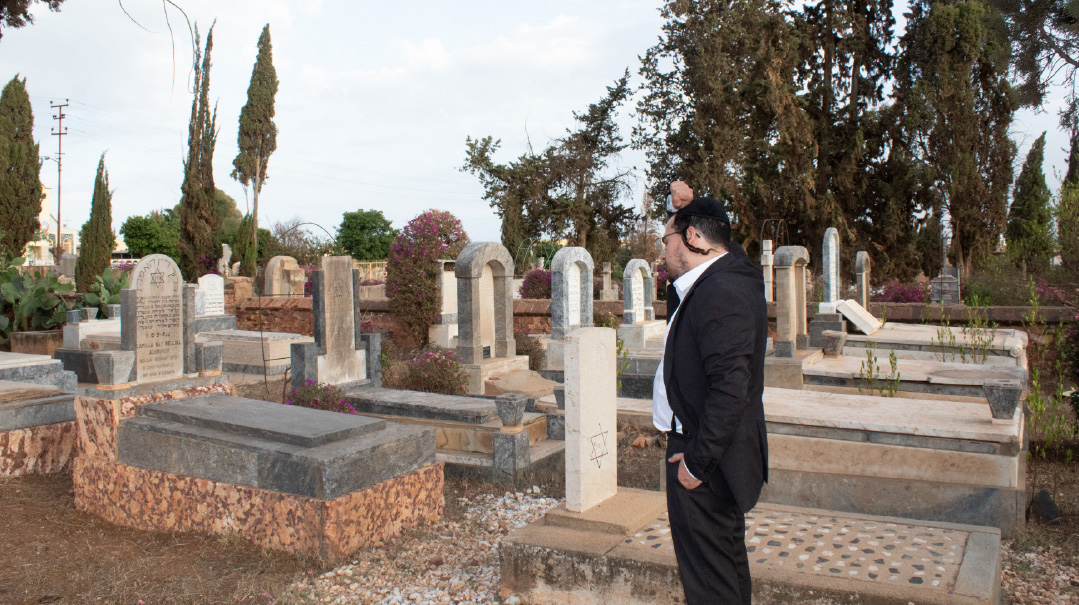
Sami Cohen visits the shul daily as president of the kehillah whose population is steady at one. Klein was given a tour of the premises, and well as the cemetery where Yemenite Jews who’d lived out their final days in Eritrea are buried
Never Alone
The two men met again that night for dinner at Cohen’s home. Cohen’s wife and daughters left Eritrea in 1998, while he stayed behind to run his business. Even though he lives in an upscale part of Asmara, his home has no electricity at night. Seeing his host’s table illuminated by a flashlight instead of a chandelier was unusual for Klein, but Cohen is one of the lucky ones in Eritrea — others have just a few hours of electricity each day, and some have no power at all. The darkness was a stark reminder for Klein of what it is like to live in a place subject to severe economic sanctions.
“If a light bulb burns out, you can’t just buy a new one,” explains Klein. “You have to have someone bring it in for you. They can’t just go on Amazon and buy a light bulb like we can.”
The lack of functioning electricity did little to dampen the two men’s spirits as they shared a meal of rice, vegetables, and bread. Cohen brought out a special treat in Klein’s honor — a jar of white tuna, treating it with the same appreciation that one might accord a finely aged steak. The two spent three hours enjoying each other’s company.
“He was old enough to be my grandfather, and there we were — a Portuguese Adenite Jew and a Hungarian Satmar Jew, schmoozing about the history of Yidden,” recalls Klein.
When it came time to bentsh, Cohen asked Klein if they could say Bircas Hamazon together.
“We washed mayim acharonim, brought out the birchonim, and started to bentsh slowly, word by word,” says Klein. “I bentshed my nusach and he bentshed his.”
The two men exchanged gifts: Klein presented Cohen an assortment of kosher chocolates and snacks, while Cohen reciprocated with two jars of tuna and some crackers. The pair met for davening once again the next morning in Asmara’s shul, davening side by side in their talleisim and tefillin.
“I already had my tefillin and didn’t need Sami’s anymore, but I didn’t want to seem like I was just using him when I needed him,” notes Klein. “I wanted to be there for him. For me, this is what makes us a nation.”
Cohen has held the distinction of being Eritrea’s only Jew for the past 30 years. Even though he doesn’t even dream of getting a minyan in Asmara’s once-beautiful shul, he still davens there daily.
“You pray here every day, all by yourself?” asked Klein as the two stood in the shul.
Shaking his head with a smile, Cohen responded simply, “HaKadosh Baruch Hu is here with me.”
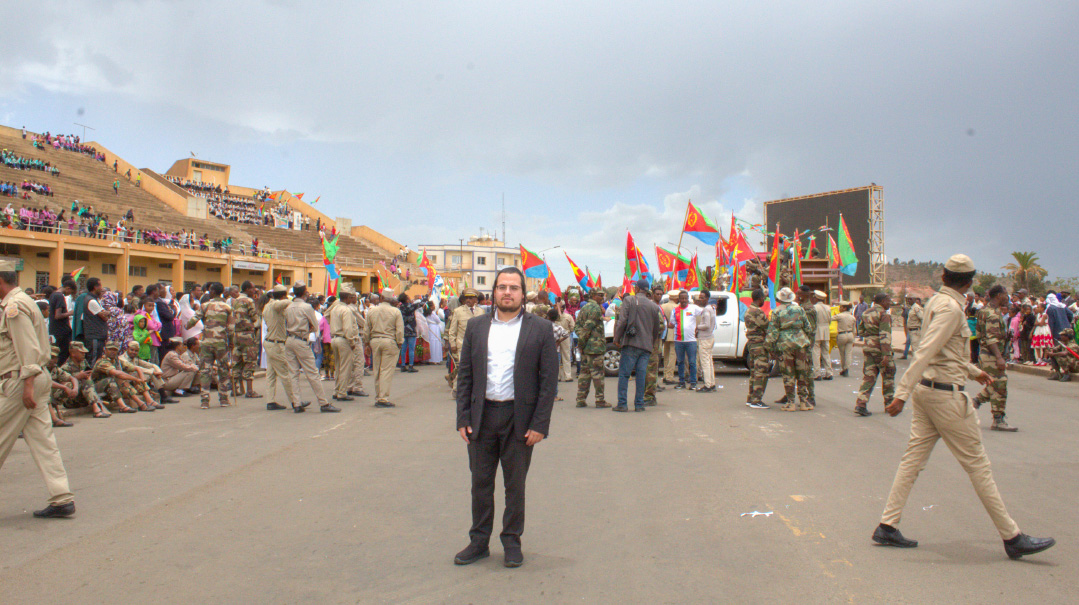
Celebrating Together
Eritrean patriotism and holiday cheer were everywhere from the moment Klein boarded his Ethiopian Airlines flight, filled with locals heading home to celebrate Independence Day. Eritrean flags festooned the entire route during his short cab ride to his hotel. Klein schmoozed at length with a Serbian minister who had come for the celebrations with a small diplomatic delegation.
Eritrea celebrates its independence from Ethiopia on May 24 each year, marking the day that its People’s Liberation Front marched into Asmara and took control of the capital city. The entire week preceding Independence Day is filled with festivities, including carnivals, parades, and various competitions. All workers have the day off, and Klein’s saw many flag-waving children and other colorfully attired celebrants as he made the trip to Asmara Stadium, where the country’s official celebration is held.
“The whole country is busy with the celebration for weeks in advance, and Independence Day itself is a really big day,” says Klein. “People walk down the street for miles to come to the center of town, with music, festivals, and many other things going on.”
The main celebration at Asmara Stadium was accessible by invitation only, and Klein managed to acquire VIP tickets. Arriving at the stadium in his own holiday attire, dressed in a rekel with his peyos in full view, Klein was announced as the “Israeli delegation,” and he found himself seated near parliament members and a short distance away from the president and his close advisors and guests, as well as his Serbian friends from his hotel. The three-hour-long celebration included numerous speeches, as well as dancing, a march that portrayed Eritrea’s independence and a children’s play.
“There were a lot of soldiers there, the country’s top singers came, the president spoke, and there was a lot of interesting culture,” says Klein. “Everyone was very friendly, and we were happy to be able to celebrate with them.”
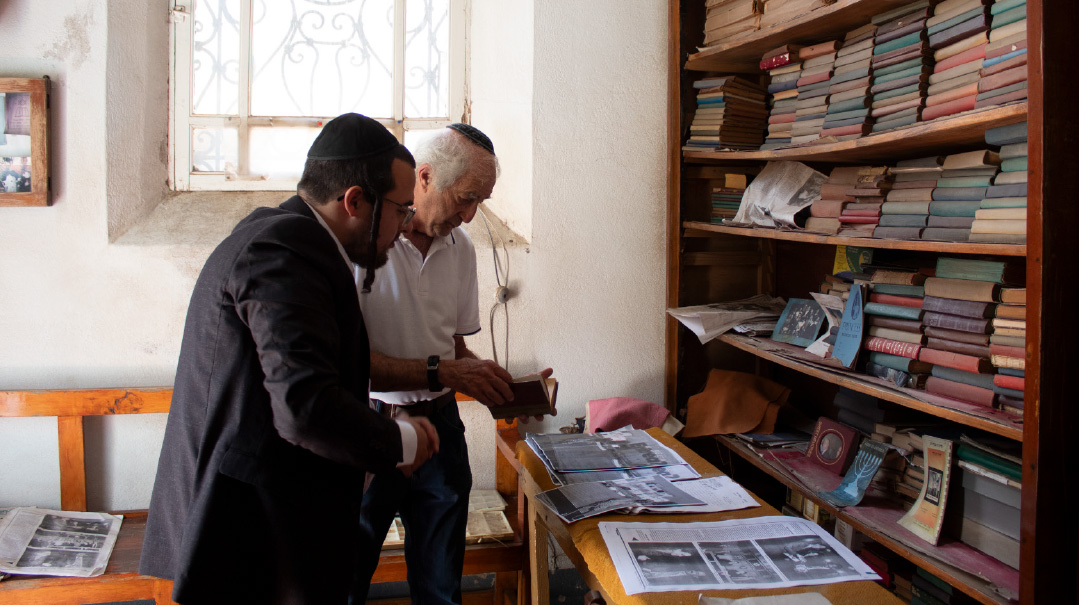
Little Rome
One of the first impressions that struck Klein as he ventured from the airport into the city was Asmara’s distinctly European feel, giving it a vibe that was anything but African.
“It had a classy and cultured look, with Italian architecture,” says Klein. “The Jewish community in Asmara was prestigious, when it existed, and people would come to Eritrea from other parts of Africa.”
During its time as an Italian colony, Asmara was nicknamed Little Rome by none other than Benito Mussolini, who encouraged his country’s architects to transform the city. One famous example of that era is the Fiat Tagliero service station, a 1938 building designed by architect Giuseppe Pettazzi in the Futurist style to resemble an airplane, complete with a pair of 49-foot-long concrete wings.
Not all of Asmara is so polished. With President Afwerki rejecting all foreign aid, more than half the country lives below the poverty line and there are less savory reminders of the country’s British colonial rule. As Israel fought for its independence in 1948, future prime minister Yitzchak Shamir was one of many captured fighters exiled by the British to prison camps near Asmara. Shamir and several other inmates escaped the Sembel Prison through a 200-foot-long tunnel that they had dug, hiding in an oil truck for three days until they finally made it over the border to safety.
Decades later, Eritrea is still home to multiple prisons, and Human Rights Watch describes the country’s penal system as extensive, with thousands of inmates facing “unlawful, prolonged, and abusive detentions.”
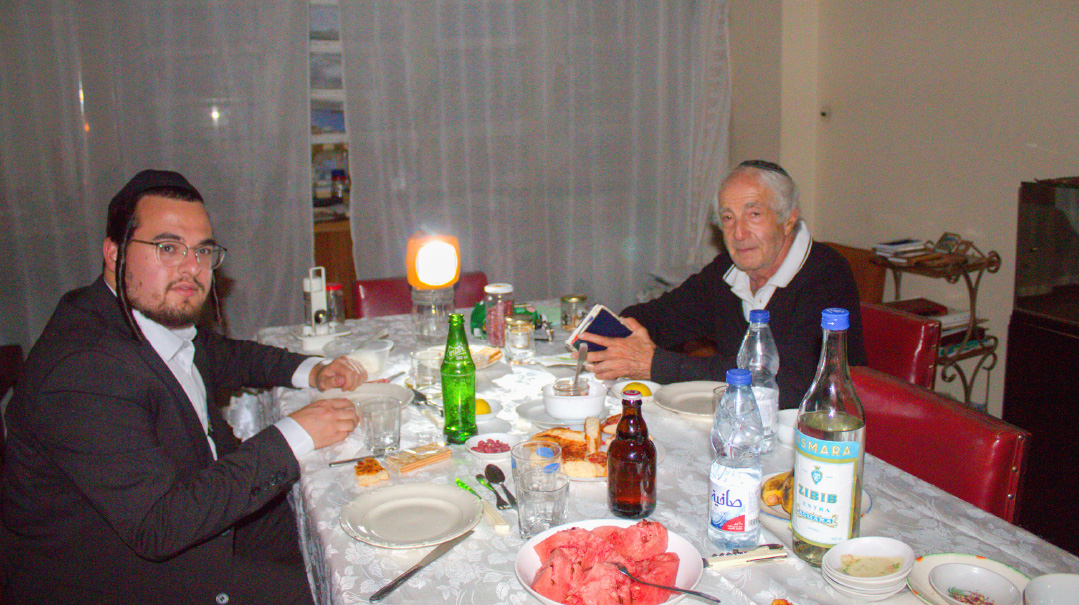
Everything Old Is New Again
Recycling takes on a whole new meaning in Eritrea due to the difficulty of importing new items, and Asmara’s Medebar Recycling Market was on Klein’s list of must-see sites. He hitched a ride to the market on a horse-drawn flatbed cart driven by a relatively young boy dressed in a blue T-shirt with cut-off sleeves and dark blue shorts. The market was, in a word, remarkable.
“There are thousands of people standing there with scraps of metal reworking it into other things, like the pans they use to roast coffee, pots, pans, cups, and bakeware,” says Klein. “Because of the sanctions, they can’t throw anything away.”
Klein saw people of all ages, including small children, using hammers and other tools to pry apart metal items so that they could be repurposed. The people Klein saw were clearly experienced metal workers. He saw one group of four men working their magic on a single piece of metal, each one of them successively striking the object with hammers, without hitting each other’s fingers. From containers to wheelbarrows and from refrigerators to war scraps, there was no metal item too big or too small to be recycled at the Medebar market.
One man Klein met had a belt buckle shaped like a Magen David, and he proudly shared that he had worked in Israel.
“He started speaking to me in Hebrew, calling me ‘ach sheli hayakar,’ ” says Klein, who received similar greetings from others who recognized him as Jewish during his stay in Eritrea.
Israel’s diplomatic relations with the country are tenuous, with Eritrea refusing to accept Jerusalem’s appointment of a Bedouin-Arab ambassador to its embassy in Asmara in 2020. Israel’s then prime minister Yair Lapid shut down Israel’s Eritrean embassy in the summer of 2022, moving its North African presence far to the south in Mozambique.
“Israel felt that there was no reason to be paying for rent, security, and housing where there was no activity and no relations with Eritrea, but a diplomat I spoke to told me that the move was seen as a huge sting,” reports Klein. “Opening an embassy isn’t just symbolic — it takes a lot to gain trust between two countries. Closing an embassy because you didn’t get any answers isn’t good. You need to try to make things work, because ending a diplomatic relationship is a significant move.”
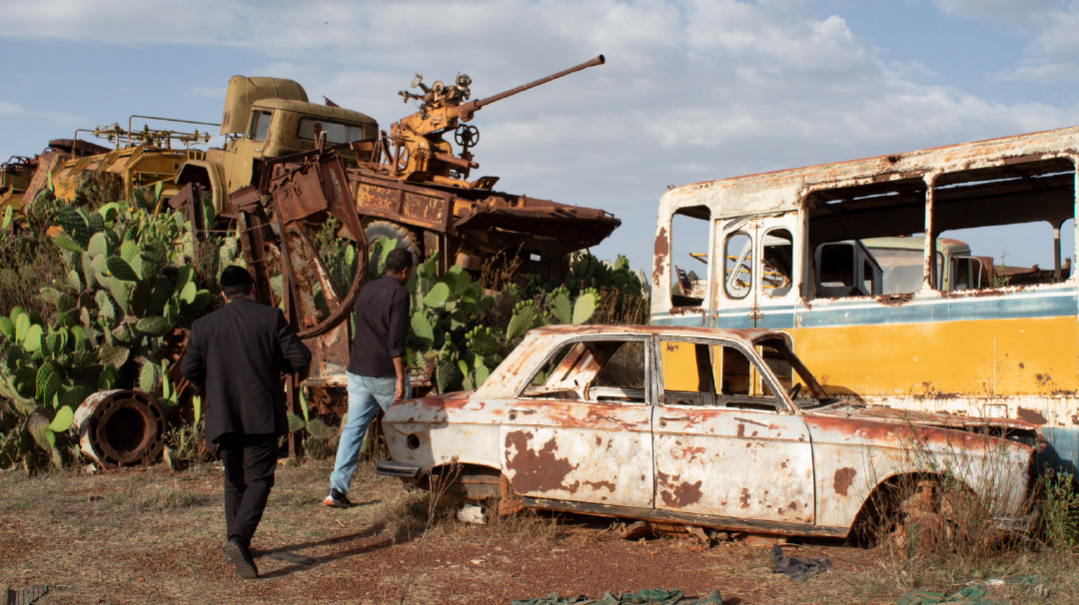
Wartime Relics
Drive through any country and you’re likely to find some kind of junkyard where old cars go to die. But Klein reports that Eritrea’s collection of retired vehicles included far more than just automobiles.
“It is like a beis hachayim for tanks,” quips Klein. “There are army tanks, airplanes, and helicopters, as well as cars, buses, and trains from all of their wars.”
The massive collection of wrecked tanks, many of which are stacked in piles, was initially started by the Ethiopian army. Concerned that the sight of its destroyed tanks would motivate the Eritrean soldiers, the Ethiopian army decided to hide them in a field outside Asmara. After Eritrean forces emerged victorious in the 30-year battle against the much larger and better-armed Ethiopian army, they collected all of the detritus of war and brought it to one site, turning it into a monument to the military effort that gave the country its independence. The site is popular with tourists.
Outcroppings of cactus sprout throughout the junkyard, their yellow flowers and fruits incongruous among the rusted heaps of wartime vehicles. Klein had the opportunity to climb on top of the tanks, some of which were pocked with bullet holes, giving him a greater perspective on the sheer size of the site and the incredible number of vehicles that dot its grounds.
Another of Klein’s atypical Asmara experiences was his visit to the city’s bowling alley. It bore only a faint resemblance to alleys he has been to in the past, and for good reason. Asmara’s bowling alley was built in the 1950s to provide entertainment to American soldiers stationed in Eritrea, and while seven decades have passed, it has yet to be refurbished.
In addition to the multi-colored stained-glass windows that adorn the walls, casting a colored glow over the premises, the alley’s offerings include video games, billiards, and darts. But it was the alley’s six lanes that most intrigued Klein, with absolutely no modern machinery anywhere in sight. Instead, teenagers are paid to stand at the far end of each lane; they clear away the pins that are knocked down, reposition them between bowlers, and send the ball back down the lane for the next bowl.
“It was very cool to see how they did that, and there was another person in front who wrote down all the scores, keeping track with pen and paper,” says Klein, who paid three dollars to bowl a full game at the alley.
Klein found the locals to be warm and welcoming during his visit to Eritrea, marveling at the fact that he felt safer walking around there as a Jew than he does in many places in NewYork. While he enjoyed his stay in Asmara, it was his encounter with Sami Cohen that was the clear highlight of his trip to a country that remains mostly closed to the Western world and rarely allows tourists.
“There is nothing Jewish there, and to find a Yid was completely unexpected,” observes Klein. “My luggage has never been late before, and I don’t know that it ever will be again, but those lost tefillin found me a Yid. It was such an incredible display of Hashgachah pratis that I still have trouble believing it actually happened.”
(Originally featured in Mishpacha, Issue 1008)
Oops! We could not locate your form.







